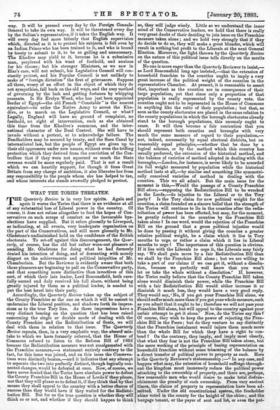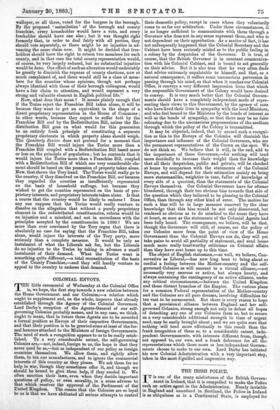WHAT THE TORIES THREATEN.
THE Quarterly Review is in very low spirits. Again and again it warns the Tories that there is no 'evidence at all of any substantial loss of Liberal power in the country. Of course, it does not refuse altogether to feed the hopes of Con- servatives on such scraps of comfort as the favourable bye- elections have supplied. But it refers gloomily to Liverpool, as indicating, at all events, very inadequate organisation on the part of the Conservatives, and still more gloomily to Mr. Gladstone's undiminished hold on the confidence of the British electorate. To set-off against this discouragement, the Quar- terly, of course, has the old but rather worn-out pleasure of assailing Mr. Gladstone for doing what he had formerly denied his intention of doing, and of descanting with moody disgust on the achievements and political iniquities of Mr. Chamberlain. But the Reviewer is evidently aware that both these pleasures are beginning to pall on the Conservative party, and that something more distinctive than invectives of this sort, of which their late leader, Lord Beaconsfield, both care- fully earned and duly received his full share, without being greatly injured by them as a political leader, is needed to put the best heart into their party.
Accordingly, the Quarterly Review takes up the subject of the County Franchise as the one on which it will be easiest to undermine the Liberal position, and shadows forth its impres- sions as to the true Tory line. As these impressions have a very distinct bearing on the question that has been raised concerning the single or double mode of dealing with the County Franchise and the Redistribution of Seats, we will deal with them in relation to that issue. The Quarterly Review repeats, then, in a very emphatic way, the absurd mis- take to which we have formerly referred, that the House of Commons refused to listen to the Reform Bill or 1866 because the Redistribution measure was not amalgamated with the Franchise measure,—a statement entirely contrary to the fact, for this issue was joined, and on this issue the Conserva- tives were distinctly beaten,—and it indicates that any attempt to separate the two into perfectly distinct, though logically con- nected changes, would be defeated at once. Now, of course, we have never denied that the Tories have absolute power to defeat the County Franchise Bill in the House of Lords if they please, nor that they will please so to defeat it, if they think that by that means they shall appeal to the country with a better chance of success than they would have if they waited for the Redistri- bution Bill. But for us the true question is whether they will think so or not, and whether if they should happen to think so, they will judge wisely. Little as we understand the inner mind of the Conservative leaders, we hold that there is really very great doubt of their deciding to join issue on the Franchise measure taken alone ; and we hold very strongly that if they do decide to do so, they will make a great blunder, which will result in nothing but profit to the Liberals at the next General Election. Moreover, the light thrown by the Quarterly Review on the nature of this political issue tells directly on the merits of the question.
No one is more eager than the Quarterly Reviewer to insist,— as Lord Beaconsfield long ago insisted,—that the extension of household franchise to the counties ought to imply a very great increase of the political weight of the counties in the representative Chamber. At present, it is reasonable to assert that, important as the counties are in consequence of their large population, yet that since only a proportion of that population is really represented by the county vote, the counties ought not to be represented in the House of Commons in anything like the ratio of their population ; but that, so soon as the county electorates are placed in the same relation to the county populations in which the borough electorates already stand to the borough populations, this anomaly ought to cease. It will then become a fair contention that you should represent both counties and boroughs with very much the same measure of regard to their population,— not, indeed, necessarily by equal electoral districts, but on reasonably equal principles,—whether that be done by a logical scheme, or by the method which this country has usually preferred, the extension of the historical method, and the balance of varieties of method adopted in dealing with the boroughs,—London, for instance, is never likely to be accorded its full weight measured by population while the historical method lasts at all,—by similar and something like symmetri- cally conceived varieties of method in dealing with the counties. This we all admit. But the main issue for the moment is this,—Would the passage of a County Franchise Bill alone,—supposing the Redistribution Bill to be wrecked in the Lords,—do injustice to the Liberal or to the Tory party ? Is the Tory claim for new political weight for the counties, .a claim founded on a sincere belief that the strength of the Tories will continue to lie in the counties after the redis- tribution of power has been effected, but may, for the moment, be greatly reduced in the counties by the Franchise Bill taken alone In one word, would the rejection of the Franchise Bill on the ground that a gross. political injustice would be done by passing it without giving the counties a greater relative political weight, be a claim which it lies in Tory mouths to urge, or rather a claim which it lies in Liberal mouths to urge ? The importance of this question is obvious. If it lies with the Liberals to urge it, the Liberals may fairly say, We shall gain more by a fair Redistribution Bill than we shall by the Franchise Bill alone ; but we are willing to take a part of our claims if we can get it, without a dissolu- tion, because we perfectly well know that you won't let us take the whole without a dissolution' If, however, the Tories really believe that the County Franchise Bill taken alone would diminish their power, while the Franchise Bill with a fair Redistribution Bill would either increase it or diminish it much less, they would have a very good reply. They would say, 'No, if you get your Franchise Bill alone, we should suffer much more than if you got your whole measure, such as you admit that it ought to be ; therefore we will not pass your Franchise Bill alone, but will appeal to the country against your unfair attempt to get it alone.' Now, do the Tories say this ? Of course, they wish to keep the power of rejecting the Fran- chise Bill in the Peers ; but do they venture to say distinctly that the Franchise instalment would injure them much more than the whole Bill for which they have a right to con- tend ? On the contrary, they imply, and imply most clearly, that what they fear is not the Franchise Bill taken alone, but the mere working of the principle of basing representation on household franchise without some trimming of the balance by a• direct transfer of political power to property as such. Here is the Quarterly Reviewer's statesmanship ;—" In any case, and happen what may, the extension of household suffrage through- out the kingdom must immensely reduce the political power attaching to the ownership of property, and there are, perhaps, few reasonable men who would desire to make total disfran- chisement the penalty of such ownership. From very ancient times, the claims of property to representation have been ad- mitted. Under the old constitutional system, the freeholder alone voted in the county for the knight of the shire;. and the burgage tenant, or the payer of scot and lot, or even the pot- walloper, or all three, voted for the burgess in the borough. By the proposed ' assimilation' of the borough and county franchise, every householder would have a vote, and every freeholder should have one also ; but it was thought right formerly that, in order to deal fairly with all parties, they should vote separately, so there might be no injustice in ad- vancing the same claim now. It might be decided that free- holders should have the right to return two members for each county, and in that case the total county representation would, of course, be very largely reduced, but no substantial injustice would be done. One effect of Buchan alteration would undeniably be greatly to diminish the expense of county elections, now so much complained of, and there would still be a class of mem- bers for the counties whose opinions, though not perhaps always identical with those of their borough colleagues, would have a fair claim to attention, and would represent a very strong and valuable element in English political life." Now, what. does that mean ? It means plainly enough that if the Tories reject the Franchise Bill taken alone, it will be because they want to get an equivalent in the shape of a direct proprietary representation in the House of Commons ; in other words, because they expect to suffer both by the Franchise Bill and by the Redistribution Bill, unless the Re- distribution Bill goes on what would for this generation be an entirely fresh principle of constituting a separate proprietary electorate in which property alone should weigh. The Quarterly Review does not pretend for a moment that the Franchise Bill would injure the Tories more than a Franchise Bill coupled with a Redistribution Bill based more or less on the principle of population ; but he contends that it would injure the Tories more than a Franchise Bill, coupled with a Redistribution Bill of which one very considerable ele- ment should be based on the possession of property taken alone. Now, that shows the Tory hand. The Tories would really go to the country, if they dissolved on the Franchise Bill, not because they regarded the counties as insufficiently represented on the basis of household suffrage, but because they wished to get the counties represented on the basis of pro- prietary interests, and proprietary interests taken alone. Is that a course that the country would be likely to endorse Does any one suppose that the Tories would really venture to dissolve on the allegation that without a purely proprietary element in the redistributed constituencies, reform would be an injustice and a mischief, and not in accordance with the principles accepted by the constituencies in 1880 ? We are more than ever convinced by the Tory organ that there is absolutely no case for saying that the Franchise Bill, taken alone, would injure the interests of the Tory party, more seriously than a complete measure. It would be only an instalment of what the Liberals ask for, but the Liberals do no injustice to the Tories by taking in advance a small instalment of their demand. What the Tories want is something quite different,—a total reconstitution of the basis of the County Franchise,—and they will hardly venture to appeal to the country to endorse that demand.



































 Previous page
Previous page